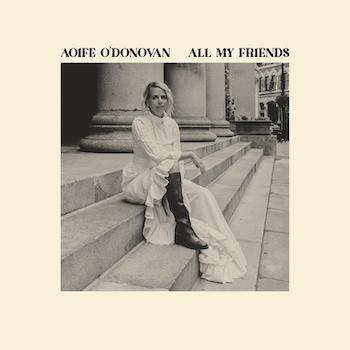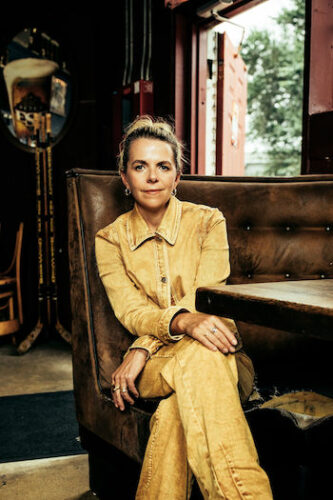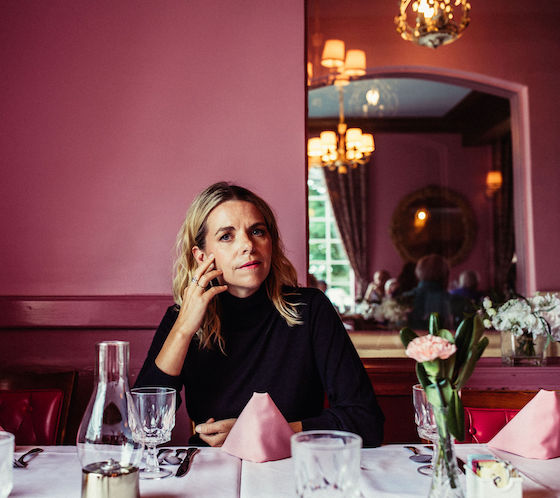Musician Interview: Aoife O’Donovan on Fighting the Same Battles, Over and Over
By Glenn Rifkin
Singer/songwriter Aoife O’Donovan’s new album is a moving tribute to the women, particularly Carrie Chapman Catt, who made the 19th Amendment a reality.
Aoife O’Donovan in concert at the Groton Hill Music Center with Hawktail on Friday, July 19 at 8 p.m.
 In 2019, before the pandemic set in, Aoife O’Donovan, the silky-voiced Grammy-winning singer/songwriter from Newton, was commissioned by the Orlando Philharmonic, where her husband Eric Jacobsen is conductor and artistic director, to write a 20-minute piece of music commemorating the centennial of the 19th Amendment. The Amendment, which guarantees women the right to vote, was passed in 1920 after decades of struggles by courageous suffragettes.
In 2019, before the pandemic set in, Aoife O’Donovan, the silky-voiced Grammy-winning singer/songwriter from Newton, was commissioned by the Orlando Philharmonic, where her husband Eric Jacobsen is conductor and artistic director, to write a 20-minute piece of music commemorating the centennial of the 19th Amendment. The Amendment, which guarantees women the right to vote, was passed in 1920 after decades of struggles by courageous suffragettes.
A daunting challenge for a Folk-Americana artist who usually pens her personal and confessional songs in a quiet room alone, O’Donovan moved from Brooklyn with her husband and young daughter to Orlando during the pandemic and, after a six-month bout of writer’s block, she began writing the music and songs that eventually became her latest album, All My Friends. The album is a moving tribute to the women, particularly Carrie Chapman Catt, who made the 19th Amendment a reality.
For O’Donovan, the move to Florida was an eye-opener, especially coming from the northeast where people assume Orlando is little more than Disneyworld and strip malls. She heaps praise on the area and its unexpected diversity, reminding people that Florida “is a purple state.” “I feel like it’s easy to get tied up in your own bubble and what you think is right,” O’Donovan said. “It’s important to listen. Living in the south has taught me that.”
Born into the magical musical world of her late father, Celtic Sojourn creator and host Brian O’Donovan, music courses through Aoife’s DNA. A graduate of the New England Conservatory of Music and influenced by her parents and icons like Joni Mitchell, Crosby, Stills & Nash, and Shawn Colvin, O’Donovan has created a lengthy and eclectic body of work. She has been part of several groups including Crooked Still and I’m With Her, with whom she won a 2020 Grammy Award for Best American Roots Song for their recording of “Call My Name,” which she co-wrote. All My Friends is O’Donovan’s fourth solo studio album, all of which were released by Yep Roc Records. I asked her about the new album .
Arts Fuse: This new album is a departure for you.

Folk-Americana artist Aoife O’Donovan. Photo: Sasha Israel
Aoife O’Donovan: Yes. For this album, I wanted to tell a story in a different way than I had on previous records, where I have been a more of a traditional confessional singer/songwriter. It took me a while to land on a specific concept, but I ended up focusing largely on Carrie Chapman Catt, who was one of the leading suffragettes and a founder of the League of Women Voters. She was one of the older stalwarts of the crew who ended up getting the final vote and convincing the politicians to be on their side.
AF: Yet you had to stay true to your own musical brand.
O’Donovan: I tried to make it sound like a folk record and embody her while giving her a more folky vernacular voice then maybe came through in her speeches and letters. I wanted the music to still feel like me and for people to be able to listen to it and say, without knowing anything, “this is just a new Aoife record. This is Aoife’s music.” I think that does come across.
AF: Inserting history seamlessly and appealingly in the music is a challenge.
O’Donovan: I really wanted to make it seem like these women could be anytime, could be now; the Women’s March or a local march for justice in your neighborhood. It could be 1919 or the 1800s when the suffrage movement began. I just wanted to paint this timeless picture of people coming together and marching and acknowledging that there have been fights that have come before and fights yet to come.
AF: You actually used Catt’s own words in a few of the songs.
O’Donovan: The song, “America, Come,” is almost entirely her text. I quote her as she says “What is this democracy for which the world is battling, for which we offer up our man power, woman power, money power?” Taking that question — and I repeat it several times in the song — it is almost a mantra for the album. “What is this democracy?” It’s a question we need to ask ourselves and we need to figure how involved and invested we are as citizens, especially now in 2024. It’s like the movie Groundhog Day. We keep experiencing the same battles over and over. It’s mind blowing to me.
AF: What do you hope people take away from the album?
O’Donovan: My hope is that people will listen to this music and take it as my own version of historical fiction. I’m telling a story. I’m putting myself into it. I’m trying to put you into it. I’m not standing on a soapbox and shouting at anybody to do anything. What I’m really trying to do is start a conversation with people. It’s important to be involved and ask each other what can we do to be involved. Voting, for example. There are so many points on this album where I shout, “Let them vote!” That is really important. I think people should be able to look outside their political affiliation and realize that involvement is crucial across the board.

Aoife O’Donovan. Photo: Sasha Israel
AF: Should the artist be responsible for leading social change?
O’Donovan: Thinking about what is the role of the artist and musician and bard throughout all of this and throughout history, it is important to find that optimism and beauty that everybody can come together and experience as one. But I think anything an artist does has to be true to whatever it is they are feeling at the moment. I recoil at the notion that it’s the artists’ responsibility to use their platform to fulfill what somebody else thinks is the right thing to do. Artists are entitled to make whatever it is they are artistically feeling at that moment. If they do that and it is honest and true, then there’s a door for me to enter that way. I don’t believe artists owe it to anybody else to do a certain thing. I know a lot of people disagree with me on that, but that’s my deeply held belief.
Glenn Rifkin is a veteran journalist and author who has covered business for many publications including the New York Times for nearly 35 years. He has written about music, film, theater, food and books for the Arts Fuse. His book Future Forward: Leadership Lessons from Patrick McGovern, the Visionary Who Circled the Globe and Built a Technology Media Empire was published by McGraw-Hill.
Tagged: 19th Amendment, Aoife O’Donovan, Carrie Chapman Catt, Eric Jacobsen
